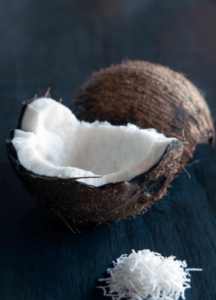
01 Jul What Do Coconut Oil and Butter Have In Common?
Choose healthy unsaturated fats for heart health. Emphasize omega-3 polyunsaturated fats (PUFAs) over omega-6 PUFAs.
Swapping out saturated fats for healthier unsaturated fats (NOT rancid, refined fats or processed carbohydrates) is best for health, especially heart health and type 2 diabetes.
Critics of the American Heart Association’s (AHA) advisory are correct in making the point that some of the vegetable oils the Association is recommending are not health promoting quality oils. I agree, the type of unsaturated fat matters. However, critics such as Functional Medical practitioner, Dr. Mark Hyman, are incorrect about the context of this advisory which is based on all the well-conducted scientific research measuring the end points of heart disease.

American Heart Association’s advisory
The AHA continues to recommend replacing saturated fats with polyunsaturated and monounsaturated vegetable oils to help prevent heart disease, according to the advisory. Limiting refined and simple sugars in the diet is also part of the standard guidelines.
“We want to set the record straight on why well-conducted scientific research overwhelmingly supports limiting saturated fat in the diet to prevent diseases of the heart and blood vessels.” – Frank Sacks, Harvard Chan professor and lead author of the advisory.
The AHA’s advisory is based on evidence that saturated fat is linked with increases in LDL – bad cholesterol – which is a major cause of artery-clogging plaque and cardiovascular disease. Saturated fats are found in meat, full-fat dairy products, and tropical oils such as coconut and palm.
Randomized clinical trials (the gold standard of studies) have concluded that a lower intake of saturated fat coupled with a higher intake of polyunsaturated and monounsaturated fat (as opposed to refined carbohydrates) is associated with lower rates of cardiovascular disease. In fact, such dietary changes can have as positive an impact on health as cholesterol-lowering drugs.
According to the advisory, coconut oil – a predominantly saturated fat that’s widely touted as healthy – raises LDL cholesterol in the same way as other saturated fats such as butter, beef fat, and palm oil. Yes, coconut oil also raises healthy HDL levels, however LDL is a more significant predictor of heart disease risk. Extra-virgin, cold-pressed coconut oil is only slightly better than butter because it has more antioxidants than butter. The most common fat in coconut oil is lauric acid (C12) not MCT oil (C8, C10). For this reason, I’ve always suggested using coconut oil sparingly and more for adding flavor or taste to a dish. For those seeking an energy and metabolism boost, choose MCT oil versus coconut oil as a supplement to your diet (see below for more on MCT oil).
My Naturopathic perspective on the advisory:
A healthy diet doesn’t just limit certain unfavorable nutrients, such as saturated fats. It should also include nutrient-rich foods that can help reduce disease risk, like olive or avocado oils, nuts, low-glycemic fruits, vegetables, pulses, whole grains, and fish.
If you’re feeling confused and without clear direction on what is healthy, the bottom line is balanced macronutrients from a varied diet is likely best. Types of carbohydrate matter, weight matters, exercise matters, and genetics matter. The same is true of fat.
From a Naturopathic point of view, the key is to adopt a whole food diet that is minimally processed and emphasizes HEALTHY unsaturated fats (not refined, heat processed, chemically treated oils) over saturated fats. If you use coconut oil sparingly for flavor that is fine, but it’s not a superfood and I advise against using it as such.
What about the omega-3 to omega-6 ratio? Indeed, a balanced omega-3/omega-6 ratio is important for health and the typical Western diet is rich in omega-6 PUFAs which increases the omega-6 value. Too much of this type of fat can increase inflammatory hormones in the body and raise our risk for heart disease and other illnesses. In fact, optimizing omega-3 PUFAs and keeping a higher ratio of omega-3s to omega-6s has been shown to reduce disease risk. We already know that omega-3s are the undisputed champion of the cardiovascular system.
If the majority of scientific evidence points to the harmful effects of saturated fats, why do some studies find no link between these fats and health?
What about the prominent meta-analysis in 2014 published in the Annals of Internal Medicine that concluded the type of dietary fat doesn’t make a difference to heart disease?
According to many researchers, including Walter Willet Professor of Epidemiology and Nutrition at Harvard Chan School of Public Health, there were extreme flaws in the study.
“They actually couldn’t do the right analysis because they were trying to summarize papers in which the comparison for saturated fat wasn’t specified. It’s really important whether you’re comparing saturated fat with starch or with trans fat or with healthy plant oils that are mostly unsaturated.”
One problem is that some researchers might use methodology that is not the best or most current for evaluating effects of dietary fats. If we’re talking about decreasing intake of saturated fat, we always have to ask: What are you going to replace it with? So if a study advises replacing the saturated fat calories with something else. The choice of that something else makes all the difference in terms of the relationship to heart disease or diabetes. If the replacement is unsaturated fats, the outcome will be favorable to health. But if the replacement is refined carbohydrates like sugars, the outcome will not be good. Unfortunately, some meta-analyses that combine many studies naively look at heart disease rates in people who have low or high intake of saturated fat without considering which types of foods people consume more of when they decrease their saturated fat intake.
Many other studies have suggested that the type of fat in the diet is extremely important, and that replacing trans fat and saturated fat with HEALTHY unsaturated plant oils can have major health benefits. To learn more about how to evaluate diet news, read this article on how to evaluate good research.
What are healthy unsaturated fats?
The main types of dietary unsaturated fats are monounsaturated fat (MUFA) and polyunsaturated fats (PUFA). The main PUFAs are omega-3 and omega-6 fats. Processing, purity and solvents matter! Oxidized, hydrogenated, processed, and unstable vegetable oils are NOT healthy.
Omega-3 unsaturated fats have a variety of vital physiological functions in the body. Because our body can’t make these oils on its own, we must get them from our food or through supplements. These fats help prevent heart disease and stroke and there’s emerging studies that omega-3s may help improve insulin resistance which is important for type 2 diabetes prevention and treatment.
Good sources of omega-3 PUFAs include fatty fish such as salmon, sardines and mackerel. Ground flaxseeds, walnuts and flaxseed oil are also rich in omega-3s.
Good sources of unsaturated fatty acids include olive oil and avocados, unadulterated nuts and seeds.
Examples of unhealthy PUFAs are: canola oil, soybean oil, peanut oil, sunflower oil, corn oil, cottonseed oil. These cheap, highly processed fats should be avoided.
What about MCT oil?
MCT (medium chain triglyceride) oil makes up a small percentage of coconut oil (which is primarily lauric acid) and I do suggest MCT oil supplementation for people with dementia or those seeking weight loss. MCT oil can help boost mitochondrial function (the power house unit of our cells) and aid with ATP (energy production). However, the recommendation for this fat supplement is done only after reviewing key lab values, such as LDL and triglyceride, and re-reviewing the lab markers after 3 months. Remember no two people are the same and no two diseases are the same.
Need diet help or still confused?
If you or someone you know needs some dietary advice, feel free to drop me a line on the “contact us” page on this site. I treat patients locally at my Naturopathic practice in Vancouver, B.C. and worldwide via phone or Skype.
To your best health!
Dr Tasnim Adatya
Naturopathic Physician, Menopause Clinician, Acupuncturist, and Health Educator

